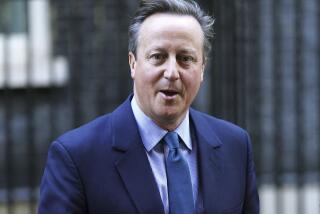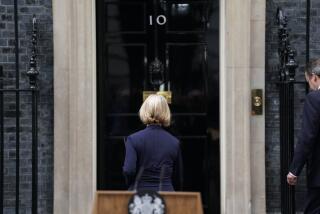If Boris Johnson cannot serve as British prime minister, who steps in?
- Share via
LONDON — If Boris Johnson dies or is incapacitated, who steps in? In the short term at least, that would be his foreign secretary, Dominic Raab, who was deputized by the British prime minister before he was taken to the hospital suffering from COVID-19.
But somewhat surprisingly for one of the world’s oldest parliamentary systems of government, prime ministerial succession is not entirely clear in Britain, whose constitution is unwritten.
Johnson, 55, was moved Monday to the intensive-care unit at a London hospital, his office said. Raab, 46, was named, before the prime minister’s condition worsened, to handle government business “where necessary,” but the longer term — if the need arose — would probably prompt some questions.
Johnson is a head of government, not a head of state. That would be Queen Elizabeth II, and the royal line of succession is well-enshrined: The throne would pass first to her eldest son, Prince Charles, 71, then Charles’ eldest son, William, 37, and then William’s three young children, in order of birth.
Under Britain’s political system, the prime minister’s job can change hands fairly abruptly. Johnson is the third prime minister since the country’s 2016 vote to leave the European Union.
If a prime minister is sidelined for any number of reasons, which can range from death to a vote of no confidence, members of his or her party — the Conservatives, in Johnson’s case — elect a new leader, whose tenure as prime minister is then formally approved by the queen.
In an unexpected emergency, one of three senior Cabinet members would probably be tapped to step in pending a party vote: the chancellor of the exchequer, the home secretary, or the foreign secretary, currently Raab.
In addition to being foreign secretary, Raab, a member of Parliament for the last decade, holds the title of first secretary of state, which signifies the ranking Cabinet minister after the prime minister.
So far, Raab’s writ has extended only to chairing government meetings, like the coronavirus Cabinet one he presided over Monday, before Johnson’s condition worsened.
He appeared on television late Monday, shortly after the deterioration of Johnson’s condition was announced, saying that “the government’s business will continue” and the prime minister was in the safe hands of medical staff at St. Thomas’ Hospital, one of London’s largest public hospitals.
“There is an incredibly strong team spirit behind the prime minister,” Raab told the BBC. He said plans put in place by Johnson before his hospitalization to fight Britain’s coronavirus outbreak would be implemented.
Experts said that technically, Britain’s government can function without a prime minister in place. And Britain’s civil service is more empowered than that in many countries to carry on day-to-day business.
Raab took over as foreign secretary in July 2019, a post he retained after Johnson’s Conservatives overwhelmingly won general elections in December. He served as Brexit secretary under Johnson’s predecessor, Theresa May.
Anand Menon, an analyst who often comments on government affairs, said if Johnson were incapacitated, Raab would be his stand-in until the Conservative Party elected a new leader, since Johnson deputized him before being taken to the hospital.
But particularly in light of chaos caused by the coronavirus, with public gatherings no longer possible, the normal party convention and vote to pick a new prime minister could take weeks or months.
Seven British prime ministers have died in office, according to gov.uk, an official government website, but none recently.
The last, according to Encyclopedia Britannica, was Henry John Temple, Lord Palmerston, who died in 1865.
Special correspondent Boyle reported from London and Times staff writer King from Washington.
More to Read
Sign up for Essential California
The most important California stories and recommendations in your inbox every morning.
You may occasionally receive promotional content from the Los Angeles Times.










